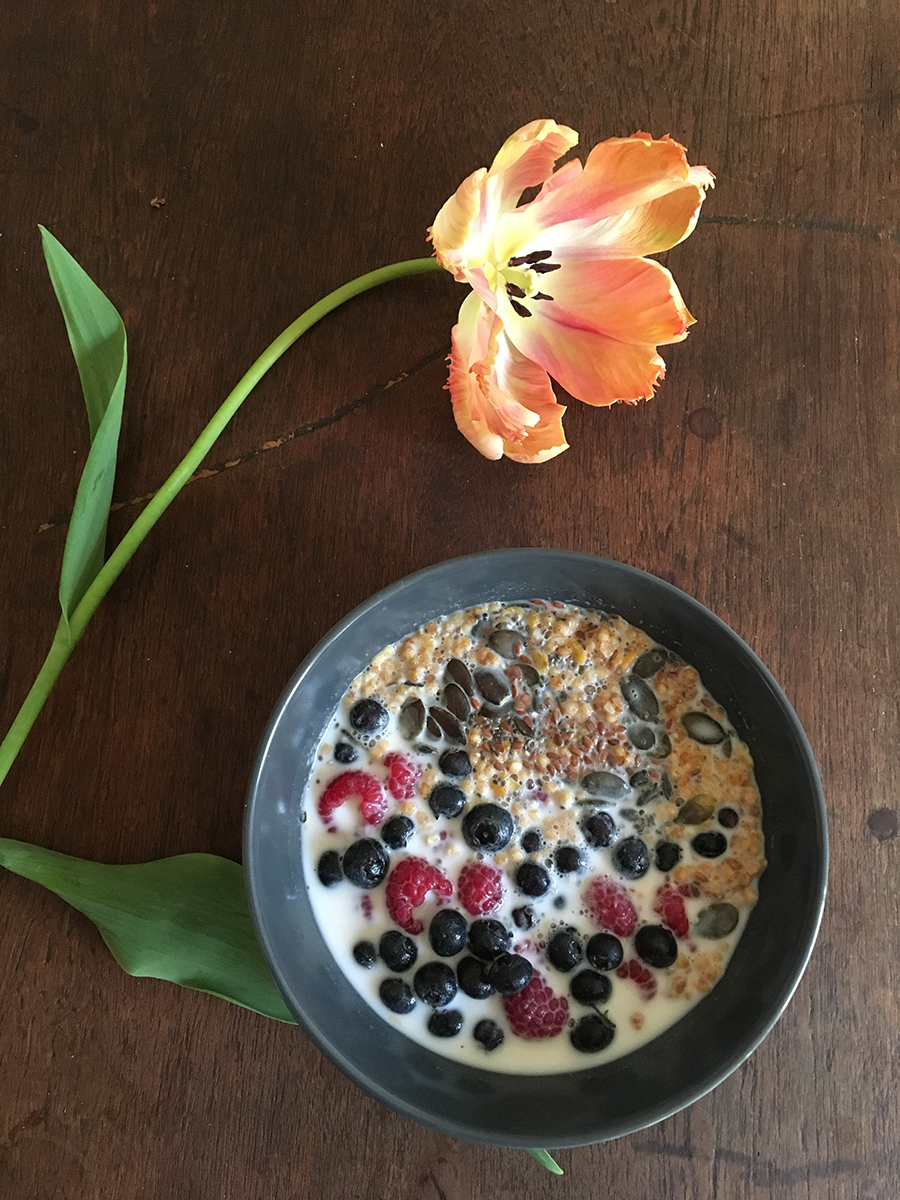According to Duke University, our habits make up 40% of what we do every day (1). This means that, in our personal life and at work, we spend half of our day repeating behaviors automatically, without even having to make a decision.
"...We are what we repeatedly do; excellence, then, is not an act, but a habit.”
Aristotle
And among these behaviors, there are bad habits we would like to give up and healthier ones we would like to acquire. We have all been there, dragging our feet to go to the gym, overindulging on bad food, beating ourselves up, then pledging to really make those changes … starting tomorrow… next week…
Indeed, most human beings, when faced with unhealthy habits they need to give up, react with sheer avoidance and guilt that eats up at them, sometimes over years. Even if they know that all this energy spent “avoiding” and feeling bad is keeping them from living the life they long for.
And when it comes to health and well-being, whatever people contemplate to change – eating a healthy breakfast before work, going to the gym 3 times a week, practicing meditation daily to regulate tough emotions, or looking to manage their workflow better – it can be an internal battle to step into action.
Since no one can see the inside of their body, nor the damage done by routine unhealthy behaviors, most people will wait until they get really sick to start making changes. And even then, having to quit unhealthy behaviors feels like “grieving”.
Since anchoring healthy habits is problematic for most, what is the best course of action to succeed?
Is willpower the key to lasting healthy habits?
Most people dread losing the harmful behaviors that are detrimental to them over the long run. It is usually because these bad habits have become coping mechanisms for underlying issues such as anxiety, stress, fear, depression and even to deal with boredom (2).
I could repeat to my clients a thousand times that healthy habits are just as addictive as unhealthy ones, it would not help them more to step into action. It is just hard for most people to step out of the comfort zone of what is familiar.
To be effective, losing a bad habit will mean replacing it with a healthy one. This is when motivation steps in. Whatever the reason, once the drive is there, the person feeds on it to initiate the change. They muster their willpower to either stop a bad habit or start a healthy one.
But, it appears the problem goes beyond motivation and willpower when adopting healthier habits. Even the people who do manage to successfully integrate significant changes, have a hard time sticking to their new habits over the long run.
We know for example that each year, an estimated 50% of the American population commit to a New Year Resolution and making changes. A third of these folks actually commit to losing weight specifically.
And what we also know is that 25% will have given up by the time the second week rolls in and that in the end, only 8% will succeed. So, the blame is most often cast on lack of willpower.
But could it simply be that our approach to how we change habits is flawed from the get go? To harness what turns actions into new long-term rituals and to get closer to the fuel that drives lasting changes, how about starting with understanding how habits actually work.
What are habits and how do they work:
Charles Duhigg is a journalist who has researched extensively the science behind our habits. He is also a New York Times best-selling author who wrote “The Power of Habit: Why we do what we do in life and business”.
He defines a habit as “a decision you made at some point, and then stopped making at some point, but continued acting on”.
Charles Duhigg
Indeed, a new habit becomes automatic once our brain no longer has to figure out what we should do regarding this specific activity. Science tells us habits are shaped in the deepest and oldest part of our brain, our basal ganglia, and the seat of our Unconscious. So, once the habit is formed, the decision-making part of our brain is not involved.
Neuroscience tells us that a habit has 3 stages, which scientists call the “Habit Loop”:
- The cue is a trigger that prompts the habit to start. Any kind of signal – visual, sound, time, place, emotion – to our basal ganglia to activate the behavior automatically.
- The habitual behavior that routinely unfolds.
- The reward is “how our neurology learns to encode this pattern to reuse in the future” says Duhigg. The reward is imprinted in our brain.
When trying to stop a harmful behavior, a person will simply focus on not doing the behavior. If the person tries to adopt a good habit, again they will do everything they can to implement the new routine.
In both cases, focus is on the behavior related to the habit. If you decide you want to exercise more, you are just going to decide to hit the gym 3 times a week and rely on your willpower to get you there!
But as we just saw, willpower and motivation can vary and be unreliable, especially in the face of good old temptations. Remember the sound of the ice cream truck? And there goes that resolve to stay away from sugar.
This is why addictions and unhealthy habits have such a strong hold. The cue signals a really good reward is on the way or that some pain will be avoided, if we proceed with the habitual behavior.
The best course to anchor a new habit:
Since our habit loop is a reward-based mechanism, Neuroscience shows us that instead of focusing on changing the behavior, we should instead concentrate on changing the cue and the reward.
Scientists knows this because activity in the nervous system, most notably the release of dopamine, happens in the brain during a habitual behavior at two moments: at the beginning when the cue happens and at the end, at the reward level.
So how do you get started in order to truly make changes that stick?
You have to first identify or define what the cue and what the reward are. Then, you have to associate a different routine to that cue and pick a different but very motivating reward. Sounds simple enough?
As much as it is relatively easy to figure out the trigger of a certain behavior, rewards are more difficult to recognize. They are also the most important factor. And because they relate to strong cravings, there could be more aspects to them than what is obvious.
It is easy for me to realize that whenever I pass by the food truck when I get to work in the morning (trigger), I eat a huge water bagel with tons of cream cheese (habit). But why am I doing this really, when I know it not the healthiest choice?
What is my reward? The fact I was craving the taste of fat? But I could have had a yogurt. Or is it the sweet sensation of satisfaction and the boost of energy from the bagel’s carbohydrates which I could easily replace by a healthy porridge with fruits? Or is it simply because it allows me to chat with a colleague I like before getting to my office?
To make sure you are successful in your habit change, here are some key principles to ensuring you will adopt your new healthy habit durably.
Your best allies to make long-lasting positive change happen:
1. Self-awereness:
One cannot change what one does not acknowledge. Habits are automatic, most of the time, we do not even realize when we are doing them. Routines unfold while we are doing or thinking about completely different things.
Like eating cakes every time you watch a movie. Without observing what you do more closely, you can’t break your unhealthy habits loop and create a new one.
In order to identify and shape your habits differently, cultivating mindful awareness enables you to explore the context in which the bad habit unfolds so you may isolate cue and reward.
To understand a bad habit, be completely present to it, observe and tune into how it unfolds. Become a detective!
2. Keep an eye on your goals:
Choosing a great reward that will stimulate your to replace your behavior for good is essential. The ultimate motivation that pushes you to proceed with this change is just as important.
Are you trying to work more efficiently (habit) after Thursday meetings (signal) so you can leave earlier (reward)? Is it because you will be able to spend more quality time with your family? Or is it that you want to hit the gym to lose weight and feel healthier in your own skin?
“The secret to permanently breaking any bad habit is to love something greater than the habit.”
Bryant McGill
When you feel like quitting, remind yourself your of your overarching intentions and why you are doing this..
3. Make easy change easy:
For new habits to stick, they have to feel easy to adopt. Take the smallest habit you need to change and break it down in the smallest most feasible steps as possible. Think about what is reasonable for you to start with, considering where you are at.
If you can perform your new behavior easily, even on the days you are not motivated, it will ensure that you stay the course. To adopt a new habit, each small win or level reached will fuel the momentum for you to keep on track.
4. Test… adjust and test again:
If your new healthy habit does not seem to stick, don’t get discouraged. You may have put the bar to high on what you can accomplish. If you decided to start meditating 20 minutes each morning but are feeling frustrated and impatient, 10 minutes may be enough in the beginning and will be more feasible.
To adopt a new habit, start low and adjust up by small increments once you are comfortable at each level. You will reach your final objective slowly but surely and avoid jumping off the wagon altogether.
5. Keep track of your progress:
To really work on being present with what is happening, I cannot urge you enough to keep track of your progress and to explore your difficulties.
Use whatever method that works best for you: notebook, online journal, app. I find writing down works best for me. Do not forget to celebrate milestones you reach as they will fuel and boost your self-confidence and your self-trust that you are capable of reaching your objective.
6. Patience and consistency:
I cannot say this one loud enough to you: Be patient & keep at it steadily. Our addiction to express solutions has led us to failure in getting the results we want.
It is tempting to give in to the shortcuts and temporary fixes that are offered to us by the massive spectrum of the health and wellness industry.
But if you are looking for a way to implement durable healthy change, no one else but you should be at the wheel of your self-care. Remind yourself that the outcomes you got with your unhealthy habits did not happen overnight.
I can assure you positive results will happen much faster when you implement a healthy habit, but they won’t happen overnight. Again what makes significant change happen is the buildup of small consistent steps.
7. Less perfection, more self-compassion:
I must remind you of this! The things we do in the name of looking for perfection can set us up for failure. Some people will simply never reach their goal because they feel they have to be perfect every step of the way. And when these high expectations are not met, disappointments can lead to giving up.
If you do fall off the wagon, do not beat yourself up! Do not judge yourself, you are a human being. What happens one day will make no difference in the long run.
Practice self-compassion and congratulate yourself for working on becoming a healthier version of yourself. All you have to do now is get back in the saddle right away.
Change your habits, Change your life
In the end, changing habit may seem daunting but it is much more feasible than you think. No matter where you stand today. Do not ever think you are predestined to fail because you failed before.
Instead, shift your perspective and get to it from a different angle. Always remember that when you start making healthy changes, you are actually empowering yourself with prevention and greater odds to live a long healthy active life!
And if you are feeling really stuck or feel the need to create a plan of action to implement with the help and accountability of a holistic coach, do not hesitate to reach out to me at [email protected].
We can discuss what you would like to see happen in the complementary session I offer anyone who is ready to take their health in hand!
Happy Healthy Long Life!
Cassis
Do you want to find out if my personal coaching programs are right for you?
- https://dornsife.usc.edu/assets/sites/545/docs/Wendy_Wood_Research_Articles/Habits/Neal.Wood.Quinn.2006_Habits_a_repeat_performance.pdf accessed 10/25/19
- https://zenhabits.net/crush/ accessed 10/25/19
- “The Power of Habit: Why we do what we do in life and business”, Charles Duhigg accessed 10/25/19




